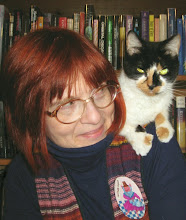After I wrote this, I discovered that Troy Davis had indeed won a reprieve. I was joyous, celebratory. How could this story not have a happy ending after all? How, after all the pleas, all the recanted testimony, all the petitions, the statements, the *proof* that the State of George had not proved its case, could Troy Davis still be murdered? The Supreme Court had a week to decide.
It took them four hours. Troy Davis had an extra four hours of life on this earth. I am sad for all the families involved, sad for Georgia, sad for my country.
I'm publishing this blog post even though it doesn't account for those four extra hours. It is, after all, about my own feelings. I cannot possibly imagine what Troy Davis must have been going through during his four hours of exhilaration, of giddy hope and final despair.
His dying statement was that he was innocent.
-----------------------------------------------------------------------------------------------------------
I look at the clock. It's three minutes after seven. This means, more likely than not, that a man named Troy Davis has just been murdered on Georgia's Death Row. There have been many protests, many calls for clemency, but they've fallen on deaf ears. Once the death machine gets going, it becomes a steamroller, inexorably pushing aside everything in its path to get to its one and only destination: the death of a human being. The execution process is engineered to be a kind of sleek machine, disengaged as much as possible from human involvement, going ahead seemingly of its own accord.
It took them four hours. Troy Davis had an extra four hours of life on this earth. I am sad for all the families involved, sad for Georgia, sad for my country.
I'm publishing this blog post even though it doesn't account for those four extra hours. It is, after all, about my own feelings. I cannot possibly imagine what Troy Davis must have been going through during his four hours of exhilaration, of giddy hope and final despair.
His dying statement was that he was innocent.
-----------------------------------------------------------------------------------------------------------
I look at the clock. It's three minutes after seven. This means, more likely than not, that a man named Troy Davis has just been murdered on Georgia's Death Row. There have been many protests, many calls for clemency, but they've fallen on deaf ears. Once the death machine gets going, it becomes a steamroller, inexorably pushing aside everything in its path to get to its one and only destination: the death of a human being. The execution process is engineered to be a kind of sleek machine, disengaged as much as possible from human involvement, going ahead seemingly of its own accord.
In this case, a rare thing happened. There was an attempt by prison staff to go on strike, to call in sick, to do anything they could possibly do to derail the machinery of death. I doubt that this worked; the machinery is too well oiled.
It's now 7:11. Mr. Davis's heart will have been checked to make sure it has stopped beating.
And the State of Georgia has now officially murdered another human being.
This time it's a little bit different, though. Troy Davis was almost certainly innocent of the crime he has just paid for with his life. There was no physical evidence at the scene, and he was convicted on the testimony of eyewitnesses. The peculiar thing about eyewitness testimony is that so many people think it's the most reliable sort of evidence, when in fact it's one of the least.
In fact, seven of the nine eyewitnesses recanted their original testimony. Of the remaining two, one is under suspicion himself for this crime.
I will never understand the death penalty. I can only see it as state-sanctioned murder which brings no justice, no solace, no closure. The dead remain dead, and one more is added to their number.
Troy Davis has almost certainly just been murdered in cold blood. It was an act that was premeditated and perpetrated with extreme malice, hatred, and cruelty.. Who will take responsibility? Who will admit to making sure that death machine did its horrific job?
Until the death penalty is abolished in every state in this land, filled as it is with decent, kind, loving people, we all must take responsibility. Possibly, just possibly, the death of Mr. Davis will start us on the road away from mechanized murder and toward a more humane justice system.
Perhaps there was a miracle that I missed while I was writing this. Perhaps Troy Davis is alive and well and hugging his family.. If such a miracle has happened, I will make an addendum to this little essay. But I doubt I'll have anything to add besides the fact that now the time is 7:37 and, for some of us, life goes on.
